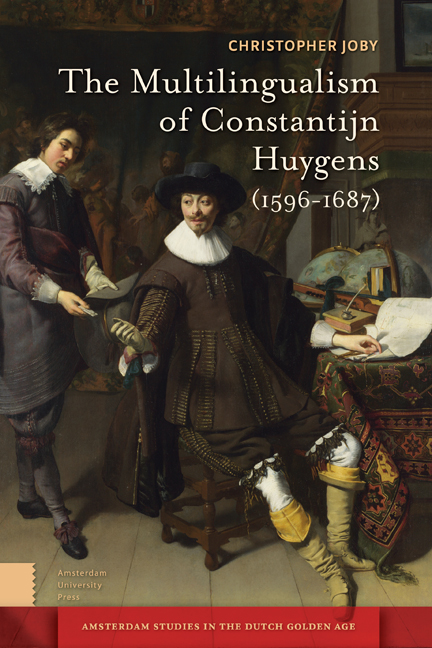Book contents
- Frontmatter
- Dedication
- Contents
- List of Illustrations
- List of Abbreviations
- Acknowledgements
- Prologue
- 1 Multilingualism: An Introduction
- 2 Huygens’s Language Acquisition
- 3 The ‘Multidimensionality’ of Huygens’s Multilingualism
- 4 Huygens’s Multilingualism in Music, Science, and Architecture
- 5 Huygens and Translation
- 6 Code Switching in Huygens’s work
- 7 The Multilingualism of Huygens’s Children
- Epilogue
- Appendix
- Bibliography
- Index
2 - Huygens’s Language Acquisition
Published online by Cambridge University Press: 16 February 2021
- Frontmatter
- Dedication
- Contents
- List of Illustrations
- List of Abbreviations
- Acknowledgements
- Prologue
- 1 Multilingualism: An Introduction
- 2 Huygens’s Language Acquisition
- 3 The ‘Multidimensionality’ of Huygens’s Multilingualism
- 4 Huygens’s Multilingualism in Music, Science, and Architecture
- 5 Huygens and Translation
- 6 Code Switching in Huygens’s work
- 7 The Multilingualism of Huygens’s Children
- Epilogue
- Appendix
- Bibliography
- Index
Summary
In Chapter 1 we learnt that the eight languages forming the core of Huygens's multilingualism were Dutch, French, Latin, Greek, Italian, English, Spanish, and German. The first language he learnt was doubtless Dutch, his vernaculus, although he picked up words and phrases from other languages, in particular French, at a very young age. Before his tenth birthday, he had begun to receive formal tuition in French and in Latin, and by his early teenage years he had learnt the rudiments of Greek, in which he was instructed by one of his Latin tutors. In relation to Huygens's acquisition of languages, these four languages form one group. A second group consists of Italian and English. From the evidence we have, Huygens began to learn these languages at some point during his later teenage years. He had the opportunity to practise both during his time at Leiden University, where he studied from 1616-1617, and after his time at Leiden he accompanied diplomatic missions to Italy and England, which allowed him to practise further his skills in these languages. Huygens used these six languages, that is, Dutch, French, Latin, Greek, Italian, and English, in the majority of his correspondence, poetry, and other works. A third group consists of Spanish and High German, in both of which he achieved a fairly high level of competence. Huygens began to acquire a knowledge of Spanish in the mid-1620s, which was quite late in comparison with the other languages he learnt. Nevertheless, he could write the language and certainly achieved an excellent reading knowledge of it. He also clearly had a good knowledge of German. There is no record of how and when he acquired this knowledge, although given the shared heritage of Dutch and German, he would have had little difficulty in acquiring at least a reading knowledge of the language. Moreover, it was not unusual for Dutch people who had a knowledge of German not to make explicit reference to this (cf. Smits-Veldt and Abrahamse: 238). The first surviving instance of his active use of the language is a number of lines in a multilingual poem that he penned in 1625. Beyond this core of eight languages, we can identify a final group that consists of those languages of which Huygens exhibited a partial knowledge in his work.
- Type
- Chapter
- Information
- The Multilingualism of Constantijn Huygens (1596–1687) , pp. 49 - 82Publisher: Amsterdam University PressPrint publication year: 2014



